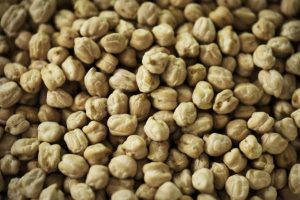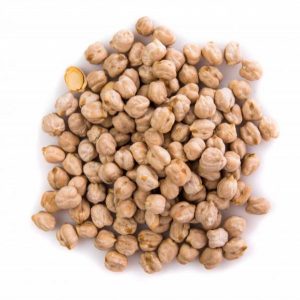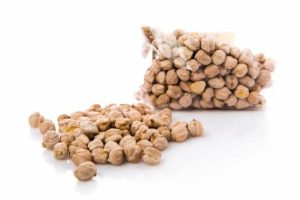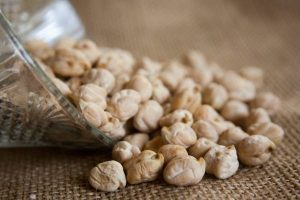Benefits and properties of chickpeas for body health
chickpeas benefits and side effects
Chickpeas are a plant that has many properties and is excellent for the health of the body. Chickpeas are a legume rich in protein, fiber, and complex carbohydrates.
Nutritional value of chickpeas:
Chickpeas are one of the most popular vegetables in some healthy people’s diet because they contain many antioxidants, minerals, nutrients, and vitamin B6 (including magnesium, folic acid, vitamin C, calcium, zinc, phosphorus, and potassium).
Chickpeas are also good for heart health because they reduce the risk of cardiovascular disease and improve digestion. The following nutritional values indicate that chickpeas have become nutritious food.
One cup of chickpeas contains the following recommended amounts:
- 268 calories
- 5 grams of dietary fiber
- 5 grams of protein
- 2 grams of fat
- 71 Folic acid F
- 29, copper
- Phosphorus
- 26, iron
- 17% zink

Unique properties of peas for skin beauty:
Eliminate skin wrinkles
Chickpeas contain a lot of manganese, which improves skin health and reduces wrinkles. Manganese is used to produce more beauty products. Manganese helps the skin fight energy. Creates free radicals that cause wrinkles and lines. This element changes the skin, and this increases water retention. Chickpeas, manganese, and other essential nutrients act as a catalyst to provide supple and radiant skin.
Lighten facial skin with a pea mask
Peeling turmeric with turmeric is very effective for peeling the face and changing skin color because it improves skin texture, removes dead cells, and moisturizes the skin. To use pea flour as a natural cleanser, do the following:
- First, mix pea flour and turmeric powder, milk, or yogurt
- After preparing this paste, put it on your face.
- After 10 to 15 minutes, wash your face with warm water.
Reduce age spots
Use the following mask to reduce age spots on your face and body:
- Cook the peas well and then mash them.
- Add some water to soften the dough.
- Then apply this paste to your face and hands.
Treatment of fungal infections
To eliminate fungal infections, including pea bread with pea flour in your diet for a month.
Treatment of leukoderma
Chickpeas are very effective in treating leukoderma. You can use the following instructions regularly for several months to reduce white spots caused by leukoderma.
- Soak a cup of peas with 8 grams of Triphala and water.
- Then, set the mixture aside for 24 hours to rest.
- Use it after germination.
Prevention of hair loss
If you suffer from hair loss and are tired of taking various supplements, use peas in your diet. Chickpeas contain vitamins A, B, and E along with omega-6 fatty acids. All of them can effectively improve the growth of mood. These nutrients can keep the scalp healthy and increase blood circulation to the scalp. The best thing you can do is boil them and add them to salads.
Eliminate facial hair
Peas are useful for removing facial hair. To do this, mix flour, turmeric, and chickpeas and make a soft paste, then apply this paste on the face and wash off after 10 to 15 minutes. Do this regularly for a month to get the best results, and you can also use this mask as a facial scrub.
Hair strengthening
Beans or peas are good for strengthening hair, and the protein and manganese in them prevent hair bleaching.
Treatment of dandruff
To treat dandruff, mix six tablespoons of pea flour with water and apply this paste on your hair for a few minutes and wash. This eliminates dandruff and reduces infection.
Help to lose weight
Chickpeas are rich in fiber and protein, which contributes to satiety. In other words, you feel hungry later. Therefore, this plant helps to overcome the need for midnight. In addition, research has shown that eating fiber can help increase the effort to lose weight.
In addition, peas help maintain blood sugar levels, which provide more energy. Combining low-fat foods (such as peas) is an effective way to lose weight. Eating processed foods and unhealthy meals can lead to weight loss.
The best part about chickpeas is that they are deficient in calories and protein. So, they are the favorite food of people trying to control their eating habits, lose weight or gain muscle with chickpeas; you are not worried about eating too many calories.
Helps increase digestion
If you have a list of the top 10 nutrients for a healthy lifestyle, it is best to include peas.
Why? Well, this is very simple: they contain a lot of fiber. Half a cup of peas contains about 6 to 7 grams of fiber. Dietary fiber plays an important role in increasing metabolism and effectively improves the digestive system. What you eat effectively through the intestines helps the digestive system, thus preventing constipation.
Fiber collects body fluids and distributes them in the feces inside the abdomen. These fluids can contain toxins that are harmful to the body. Fiber controls the balance of pressure, which prevents toxins and bacteria from entering the stomach, helps increase the level of healthy bacteria, and kills unhealthy bacteria. In addition, it is important to understand that a decrease in bacteria in the stomach can lead to several digestive problems.

Properties of chickpeas for women’s health:
Useful for pregnant women
Pregnancy is undoubtedly a special time in a woman’s life. However, there is no doubt that it can lead to significant weight gain if you are not careful. Chickpeas contain essential vitamins and nutrients that pregnant women should stay active and improve their general health. One cup of peas can provide 12 grams of dietary fiber and 15 grams of pure protein. The easiest way to eat peas is to cook them and add them to salads.
Women’s health
The chemicals or saponins in chickpeas help prevent breast cancer and osteoporosis in women and reduce hot flashes during menopause.
Properties of chickpeas for health and treatment of diseases:
Maintain blood sugar
Chickpeas are a major source of the highly complex carbohydrates found in other types of legumes. The body gradually digests complex carbohydrates and then stores them as energy for later use. This fact is significant because most carbohydrates have no properties and have no effect. Some carbohydrates quickly raise blood sugar, which in turn causes energy fluctuations in the body. (These carbohydrates are also called simple or fast carbohydrates.) Other carbohydrates are exactly the opposite and provide constant energy (known as complex carbohydrates).
Improves cardiovascular
Research has shown that chickpeas can improve heart health by lowering bad cholesterol levels in the body. Proper cholesterol balance can help deal with cardiovascular problems (such as high or low blood pressure).
It helps the body in different ways to reduce the risk of heart disease. Because chickpeas are high in fiber, they reduce all the fat accumulated around vital organs (including the heart). In addition, beans are rich in vitamin B6, which significantly increases the level. Minimizes homocysteine in the body Having too much homocysteine can lead to various heart diseases.
Cancer prevention
In addition, regular consumption of peas may help reduce the risk of cancer symptoms. In the health section, you read that some studies have shown that chickpeas may have certain protective components because they are high in fiber. Studies have also shown that chickpeas can minimize the symptoms of colon cancer. They help maintain the digestive system. It is useful to clean and sanitize all kinds of toxins and bad bacteria. By balancing body pressure levels, they significantly increase the growth of healthy bacteria, which significantly minimizes inflammation. In other words, cancer cells do not multiply and spread in the body.
Cholesterol-lowering
Chickpeas lower bad cholesterol. Including 3/4 cup of chickpeas in your diet helps lower LDL (bad) cholesterol. Including it in the diet reduces the risk of heart disease and stroke.
Bone health
Chickpeas also contain calcium and iron. They are also rich in nutrients and vitamins that promote bone health. Osteoporosis is a widespread disease in the United States and under the wrong conditions can lead to joint problems and back pain that cause long-term discomfort. Calcium and phosphate are vital components of bone structure. If you consume too much phosphorus and calcium, it can lead to bone loss.

Comfortable sleep
Chickpeas are a rich source of amino acids, tryptophan, and serotonin and play an important role in regulating mood and sleep. Tryptophan consumption at night calms the person.
Treatment of kidney stones
Consumption of chickpeas prevents kidney stones. To do this, soak a cup of peas in water, keep it overnight, and then taste it with honey the next day to prevent kidney stones.
Help treat jaundice
To treat jaundice and vomiting, drink a cup of peas soaked in water with yellow sugar.
Arterial health
Fiber helps to create a gel-like substance in the digestive tract. It combines with fatty acids to help balance cholesterol levels in the bloodstream. Soluble and insoluble fiber have been identified as important nutrients.
They help reduce the risk of high blood pressure and protect the arteries against plaque, which controls blood pressure levels. Maintaining high blood pressure can greatly reduce the risk of stroke or heart attack. They have shown that only (three-quarters of a cup, steamed or boiled peas) can significantly reduce the risk of high blood pressure, heart attacks, and stroke. In other words, they remove LDL (bad cholesterol) from the body. Keep away
Helps increase alkalinity
It is important to understand that beans are alkaline and help the body balance its blood pressure levels. The more balanced this level is, the less you have to worry about producing toxins. Eating chickpeas with a nutritious source of healthy fats (e.g., olive oil) increases their absorption in the body, increasing their effects. In addition, beans are a powerful source of two essential nutrients. Another case: magnesium and manganese.
Improve eye health
Eating peas can improve vision. Undoubtedly, we all spend a lot of time in front of a computer screen, which can have devastating effects on the eyes. For this reason, you need to make sure that you do your best to restore eye health. Chickpeas contain vitamin A, which is the main vitamin in mucous membranes, skin, and eyes. So if you eat peas every day, you can get vitamin A regularly. Wait, so you improve your eyesight and protect yourself from infection and free radical damage.
Safety system
Chickpeas are rich in iron, which helps carry oxygen to the body, maintain the immune system’s strength, and are essential for good metabolism.
Reduce the risk of inflammation
Chickpeas also contain another nutrient called choline. This flexible component in chickpeas improves the sleep cycle, increases muscle movement, and improves memory. The best advantage of this body is that it increases the ability to absorb fat, which has a long way to go to help increase the body’s defenses against inflammation.
It is rich in folic acid.
Chickpeas contain many nutrients, vitamins, and minerals, for example, a good source of iron, zinc, phosphorus, B vitamins, and folic acid. All of these nutrients play an important role in maintaining good health. If you are a vegetarian, these nutrients are even more important to you because chickpeas contain large amounts of folic acid, also called vitamin B6. This vitamin is vital for the body and the formation of new cells and helps to combine DNA. Folic acid helps the body bind to the body with B vitamins, proteins, and amino acids.
Folic acid imbalance can lead to several health problems, including anemia, poor immunity, and poor metabolism. In pregnant women, folic acid deficiency can lead to (neural tube damage).
Contains starch
Chickpeas also contain starch. Chickpea starch burns slowly. In other words, the body does not break it down quickly and converts it into glucose – which raises blood sugar, unlike the sugar content in pasta. Processed foods, refined flour, white bread, and baking soda take a long time to break down pea starch. Natural sugar starch (known as glucose) is made by the body from glucose to make many of them and uses important body functions. But glucose can be a problem for people with diabetes or prediabetes.
Contains magnesium
12.5 grams (or a tablespoon) of chickpeas contain approximately 14.4 mg of magnesium. Numerous scientific studies in men have shown that magnesium deficiency can indirectly lower testosterone, and unfortunately, magnesium deficiency is common in most Americans. Is.
People usually do not get the recommended amount of magnesium from regular food sources. If you combine them with other testosterone-containing foods (such as fish and vegetables), you do not even need to take supplements to regulate hormone levels. However, it is advisable to consult a medical professional before doing anything because it is significantly reduced in men but has also become a problem in young men. In men, the surface successfully binds to the body due to the protein of these enzymes, making them impossible to use. Another study found that testosterone, instead of binding to globin, decided to bind to magnesium, which increases hormone levels, thus providing powerful benefits to the body.

Contains manganese
One cup of cooked chickpeas contains approximately 1.69 mg of manganese. This important nutrient has many benefits. Manganese helps increase bone strength by increasing the number of minerals, and in this regard, peas can be an amazing diet for women.
Manganese deficiency is common in older and postmenopausal women, so supplementation with these minerals is essential. Scientific research has also shown that manganese deficiency in women can lead to osteoporosis. In addition, manganese kills free stem cells. These cells can cause cancer and several debilitating diseases in the body, but manganese has strong antioxidant properties. Therefore, along with manganese supplements, it is important to use one or two cups of peas to increase the level of these minerals.
A good source of protein
Chickpeas can give you 15 grams of pure protein per half-cup. You can cook them, steam them or fry them in olive oil. Just make sure you eat amino acids (like eggs). Protein deficiency can lead to several problems, including muscle fatigue, tiredness, cataracts, cardiovascular disorders, skin health, and inadequate hormone production due to low protein. This plant has become food for vegetarians around the world.
Iron source
One cup full of peas contains about 4.7 mg of iron. Iron is one of the most important nutrients in the body. Iron deficiency can lead to disease (the most common is anemia). Anemia prevents the production of healthy red blood cells and converts them into the blood. With an imbalance of these cells, you can experience several detrimental effects, including weakness, fatigue, confusion, and an inability to deliver a healthy amount of oxygen to the body’s tissues (which, in short, can lead to anemia. It can cause other problems (such as hair loss and brittle nails). Fortunately, you can control this problem with iron supplements.
Vitamin B complex
Chickpeas contain B6, B5, B2 (riboflavin), and B1 (thiamine). According to several reports, chickpeas are one of the richest sources of B6, which improves the immune system because it contains vitamin B5. They can take care of the digestive system and the immune system at the same time.
It contains vitamin A (and beta carotene)
Vitamin A is good for bone and eye health, and beta-carotene is the raw material converted to vitamin A. Beta-carotene is an essential nutrient that helps maintain the body’s immunity and improves skin.
Vitamin C
Chickpeas contain small amounts of vitamin C, although vitamin C is mostly found in citrus fruits (such as oranges and grapefruits). There are 3.8 grams of vitamin C in every 100 grams of chickpeas. Vitamin C is a good way to maintain blood vessels, keep the skin clean, maintain muscle health, while men need 90 mg of vitamin C daily, women 75 mg.


